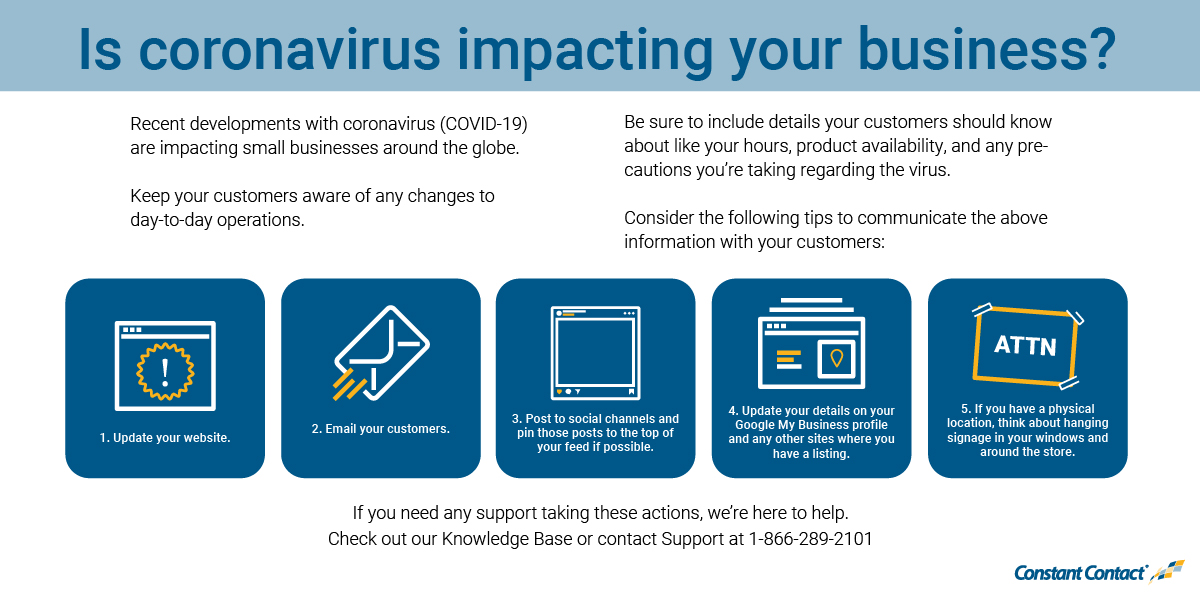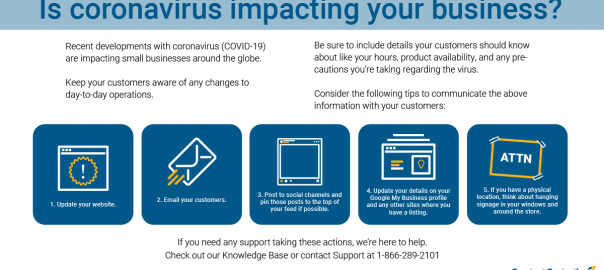
The COVID-19 (coronavirus) pandemic is changing the way we all do business.
We’re all learning how to be flexible, imaginative, and resilient — the best traits a small business owner can have, besides tenacity.
I know that it’s hard to not get bogged down by all the information that’s coming at us, but as a small business owner, it’s important to focus on taking care of yourself so you can take care of your business. And remember — you’ve got this.
Small business owners are some of the most resourceful and resilient people we know. And now’s the time to lean into that resourcefulness, pull up your bootstraps, and get to work.
In this article, I’ll show you some ways that you can take stock of the situation, generate solutions, and take action to protect your business. And if you remain flexible enough to make changes on the fly, you can get through this… and will likely be stronger and better for it.
So let’s talk about how we do that.
Take stock of the situation
I have a background in emergency response and observing and taking stock of our surroundings is what we, as humans, tend to do naturally.
This is the time when we stop and make sure that everyone is safe. And that should be your first priority.
Make sure that your family, staff and especially yourself, are safe and safeguarded, to the best of your ability.
And if you’re struggling with excessive stress, look into resources for managing your stress and anxiety in the midst of a crisis.
Next, make sure that you’re doing everything you can to safeguard your customers as well.
Once you’ve done what you can for everyone’s health and safety, it’s time to figure out how this situation may affect your business.
Generate solutions
Honestly, there are always a lot of unknowns here, but it’s important to think about various possibilities and what you can do to adapt to them. The problems you face will vary depending on the nature of your business, and so your solutions will vary too. Below are some examples of how you might approach problem-solving.
Start with the less scary questions first:
- What if you end up short on staff?
- Think about reducing your hours or days that you’re open
- What if you have a problem keeping certain items in stock?
- Check your supply channels to find out how long it will take to get new stock
- Think about limiting high-demand items to one or two per person
- Designate someone to be in charge of the daily operations, in case you can’t be
Then dive deeper.
I’ll be honest — these are some of the bigger, scarier questions, but it’s important to look at them directly and make a plan based on what you’re able to do.
- What can you do to help your staff?
- Can you continue to pay them if they can’t come in?
- Do you have something you can give them to help them out?
- One local restaurant gave all of their perishable food items to their staff to help feed their families
- Can you offer discounts so they can save money on items they need?
- Can you create special “comfort” kits of things they might not need, but might want?
- Do you have supplies that you can donate to the local shelter?
In an emergency, or crisis, whether large or small, we’ll often vacillate between the ‘taking stock’ stage and the ‘figuring things out’ stage because things are always changing.
And at some point we may have to ask ourselves the bigger questions:
- What if I have to temporarily close?
- Think about selling your wares, services, etc. online (I’ll have more on this later)
- Think about how this would affect your family, as well as your staff and their families — can you help them in some way?
- Is the “temporary” plan you put into place sustainable? If so, for how long?
- Are there things you can do to adjust your plan so it will be sustainable?
Take action
As you started asking yourself those “what if” questions, you likely started thinking through the answers as well.
As you figure out those answers, you’re starting to formulate a plan — whether you realize it or not.
This is probably a good time to mention that you should be writing these things down. What you do now can be a roadmap for a future ‘disaster plan’ for your business, which could potentially make things a lot easier, should you ever have the need again.
What you can do to adapt and overcome
Work from home
If you can, set up work from home options for yourself and your employees. See if you can designate employees to help you keep up with online orders, create social media posts, and fulfill other essential business needs.
And if you’re working from home, set up a work station that can stay in place for as long as you need it. Don’t try to work from your kitchen island or bed. Create a space where everyone in the family knows that if you’re in it, you’re working. This can help you to stay focused when you’re working, as well as set up boundaries between working and hanging out at home.
Sell your wares online
As I mentioned before, this is a great option and a great opportunity. If you haven’t been selling online, now’s your chance to start. Setting up an online store is super easy, and doing so will expand your business beyond your doorstep.
What? You’re not a retail store? No problem. You can always sell gift cards online. And I highly recommend selling them at a discounted price to both help your customers save money, and have something to look forward to.
Have a restaurant? Can you provide a to-go option, delivery, or even make-at-home meal kits that are a variation of your usual fare?
Own a gym, health club or yoga studio? Hold exercise classes online! Start a YouTube channel and hold live-stream classes for your customers — just adapt the routines for people working out at home instead of in your facility.
If you don’t already have an ecommerce site, we’ve got you covered with two options. The first is shoppable landing pages. The second option is to open an online store.
Stay in contact
When you’re constantly having to make changes to adapt to an ever-changing situation, it’s imperative that you let your customers know what you’re doing and when. So,…
Keep your hours updated on:
- Your website
- Reviews and listings sites
- Your social media platforms
Reach out via email
Make sure to send your contact list updates on how your business is adapting, how you and your staff are doing, and provide any information that you think might be helpful.
 Here are five ways you should consider updating customers about your coronavirus response immediately.
Here are five ways you should consider updating customers about your coronavirus response immediately.
Use your resources
You are not alone.
That’s an important thing to remember.
Connect with other small businesses in your area and brainstorm about how you can help and support each other.
Find and use your resources. Whether it be a community of other small business owners around the globe, government agencies, or the support and marketing teams of Constant Contact, you are not alone. So reach out, and get help when you need it.
Do good
If you’re able, do what you can to help your community. Patronize other small businesses in your area or donate money, goods or services to nonprofits whose resources may be strained right now.
Be positive
Remember when you’re communicating with your staff, customers, and community, it’s important to be positive. A positive attitude goes a long way in helping people overcome adversity.
So, don’t just post the “have to”s on your social media platforms, post silly pictures of your cat sitting on your keyboard while you’re trying to work. Share stories of people helping each other. Send tips on how your customers can stay healthy, stay connected, and maybe even stave off cabin fever.
Getting back to normal
I know we’re not there yet, but it’s still important to plan ahead.
So take a few minutes to review the changes you’ve made and what you’ve learned, then think about how you can use that information to move forward.
What can stay
Were the “kits” a big hit? Did the online store get more traction than you thought it would? Then think about making them a permanent part of your business.
Did having reduced hours turn out to be a great thing for you? Then think about keeping them or finding a happy medium between what you had before and what you have now.
Maybe holding online classes was the best thing that happened to your studio since Yoga was invented. If so, don’t stop just because the emergency is over. Keep them going and see if they are a good addition to your business long-term.
Plan for the future
Sometimes making plans can be the best medicine for tough times. So, start making plans for what comes after the emergency.
Reach out to your suppliers to find out how long it will take to get what you need to re-supply.
Develop a system for how you’ll recall your staff. Will it be in stages or all at once?
Make a plan for getting your hours back up to what they used to be. If you’ve been closed, will you just throw your doors open, or make it an event?
Whatever you decide…you can do it. You’ve got this.
After all, you’re a small business owner. You’re adaptive, creative, flexible, resilient, and tenacious. And you’re not alone.
One more thing
We’re all hoping this will be over sooner, rather than later, and when it is, be sure to take time to connect with your team. Discuss what you and your team accomplished during this time. Figure out what did and didn’t work. And congratulate everyone on being resilient and making it through.
Rest assured, you learned and grew during this time, and now you, your business, and your community are better…stronger for having been through it all — together.
Looking for more guidance in navigating a crisis situation as a small business? Check our official Disaster Response and Recovery Resources for Small Businesses. We’ll be updating this page continuously as we develop guidance for small businesses dealing with this situation.
Business & Finance Articles on Business 2 Community
(57)









